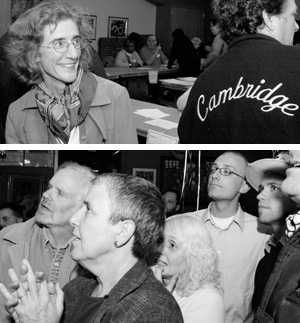Winning issues didn’t work for all school board candidates

Patty Nolan is all smiles at the Central Square senior center Tuesday night after she came in first in School Committee votes. Her fellow victorious challenger, Luc Schuster, at rear with glasses, watches cagily as numbers come in confirming his committee seat. Schuster’s election night gathering, which quickly turned into a victory party, was held at the Druid Pub in Inman square. (Photos: Schuyler Pisha)
Victory was especially sweet for School Committee challengers Luc Schuster and Patty Nolan in Tuesday’s election because they had to fight hard against tough incumbents on issues that seemed to be a focus of the entire community.
But it’s a mystery as to why they bumped two incumbents who stood for the same thing: reallocation of resources from the central administration to the classroom.
Nolan is a soccer mom who rode into the committee position on a wave of voter dissatisfaction with the schools; Schuster is a 25-year-old teacher who feels he captured the youth vote.
The common factor is that they both vow to cut administrative positions to put more resources in the classroom. Ousted incumbent Ben Lummis, a teacher himself, had said he would cut as many as 50 administrative positions and save more than $3 million on administrative costs if reelected.
Fellow ousted committee member Marc McGovern “was sending the same message as Patty and I,” Schuster said. “So it doesn’t make any sense.”
McGovern and Lummis, though, were initially elected by making the same promises as Nolan and Schuster, political pundit Robert Winters noted.
“Two years ago they were the challengers when voters were very unsatisfied. The irony is that they were now incumbents, and people are still dissatisfied with the schools,” Winters said.
Schuster said that as a teacher he has seen the difference of having well-funded classrooms, including money for teachers aides, and those without it.
“My priority will be to get better support … guidance counselors and mental health specialists for kids with mental problems,” said Schuster, who had taught at the King Open school and now teaches in Boston. “If we have strong support, teachers will be able to manage the classrooms better.”
When teaching in Cambridge between 1999 and 2002, he noticed that the city had spent money on literacy specialists after the controversial merger of the elementary schools.
But resources at that time “were not allocated proportionately,” he said, and after the first year, the literacy specialists were cut.
“They funded the program at first to appease concerns about the merger,” he said.
Now, he said, it is time to put money back into having one-on-one special education aides and other support mechanisms for teachers who can’t teach school and baby-sit behavior problems at the same time — and prevent parents fleeing toward private schools.
He said he thought “Patty was elected on the continued wave of upper-middle-class parent dissatisfaction, and rightfully so. Our schools are not doing a good job.”
“We don’t spend money effectively in Cambridge,” Schuster lamented.
Nolan said she would work to change that and hopes that before she is done, “we can become a model.”
Winters said he thought that Nolan’s gender might have played a role in the vote; statistically people in Cambridge have voted for female candidates, especially those with whom they can identify.
